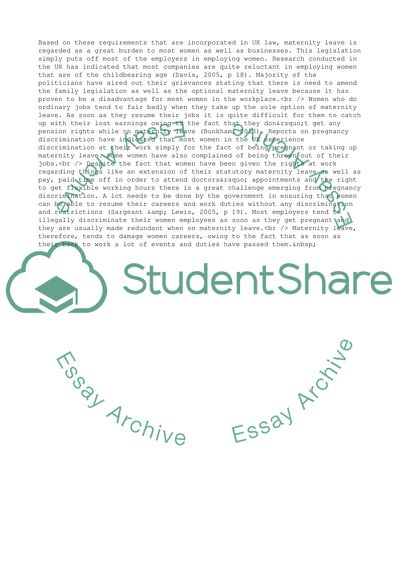Cite this document
(Maternity Leave as a Great Burden to Most Women as Well as Businesses Essay - 1, n.d.)
Maternity Leave as a Great Burden to Most Women as Well as Businesses Essay - 1. Retrieved from https://studentshare.org/business/1634716-the-requirements-for-employers-to-allow-maternity-leave-under-united-kingdom-law-is-a-disadvantage-to-women-in-the-workplace-discuss-this-statement
Maternity Leave as a Great Burden to Most Women as Well as Businesses Essay - 1. Retrieved from https://studentshare.org/business/1634716-the-requirements-for-employers-to-allow-maternity-leave-under-united-kingdom-law-is-a-disadvantage-to-women-in-the-workplace-discuss-this-statement
(Maternity Leave As a Great Burden to Most Women As Well As Businesses Essay - 1)
Maternity Leave As a Great Burden to Most Women As Well As Businesses Essay - 1. https://studentshare.org/business/1634716-the-requirements-for-employers-to-allow-maternity-leave-under-united-kingdom-law-is-a-disadvantage-to-women-in-the-workplace-discuss-this-statement.
Maternity Leave As a Great Burden to Most Women As Well As Businesses Essay - 1. https://studentshare.org/business/1634716-the-requirements-for-employers-to-allow-maternity-leave-under-united-kingdom-law-is-a-disadvantage-to-women-in-the-workplace-discuss-this-statement.
“Maternity Leave As a Great Burden to Most Women As Well As Businesses Essay - 1”, n.d. https://studentshare.org/business/1634716-the-requirements-for-employers-to-allow-maternity-leave-under-united-kingdom-law-is-a-disadvantage-to-women-in-the-workplace-discuss-this-statement.


